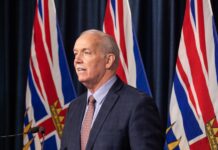Response to COVID-19 has skyrocketed Premier John Horgan’s ratings by 17 points in just seven months to 68%
ACCORDING to the latest version of Insights West’s “Government of British Columbia Report Card,” the BC NDP has improved their already strong approval ratings and support across BC and voting intentions for NDP have reached their highest level since Insights West tracking began eight years ago.
COVID-19 bumps out housing, climate change and the economy as the most important issue facing British Columbia, and government approval ratings on nearly every issue – COVID-19 response, healthcare, education and economy – have improved since the previous wave last November.
It comes as no surprise that COVID-19 is the number one issue facing British Columbians right now, with 32% choosing it as the most important issue facing the province, relegating housing prices (13%) to second place position after a five year run at the top of the list. Other important issues such as the economy (11%), healthcare (7%), homelessness (6%), jobs (6%), the environment (5%), taxes (5%), and poverty (4%) are much lower on the list of priorities.
It is interesting to note that housing prices are the number one concern (24%) among 18-34 year old residents while COVID-19 is chosen by slightly fewer (21%). Housing prices appear much further down the list among those 55 years+ (6%), and those 35-54 years old (16%).
The government’s response to the COVID-19 pandemic has apparently resulted in a massive increase in approval ratings for the BC NDP and Premier John Horgan. Pre-pandemic, Horgan’s approval rating was already strong, but the response to COVID-19 has skyrocketed his ratings by 17 points in just seven months to 68%, a higher level higher than for any political leader in BC since tracking began eight years ago.

Conversely, there is an opposite trend in approval levels for opposition leaders, as the BC Liberal’s Andrew Wilkinson rating has dropped five points since November to 30%. Interim Green leader Olsen has made his debut at a 29% approval rating—this is the lowest of any Green leader since the 2017 election, but 44% of BC residents don’t know enough about him to provide a rating. Bolin from the BC Conservative Party has an 18% approval rating, but similarly, 49% of British Columbians didn’t know enough about him to provide a rating.
These approval ratings could translate into a landslide victory for Horgan when B.C. goes to the polls in May of 2021. In fact, if an election were held right now, the NDP would receive 47% of the decided popular vote primarily at the expense of other parties which have seen their support diminish since the start of the pandemic.
BC Liberal voting intentions have dropped to 29%, the lowest post the 2017 election. The Greens have also dropped to 11%, a long decline from the 17% of votes they achieved in 2017. Support for the BC Conservatives, who appeared to be gaining momentum in the past couple of waves, has dropped from 18% to 12% since the last measure in November of 2019. Perhaps some consolation for the opposition parties is the fact that the undecided vote is particularly high at 23% right now, as the election race is far from the top of the public agenda.
There are several other shifts in voting intentions between demographic segments that are worth observing. The BC NDP now receives the same support (47%) across all age groups—compared to where the party has traditionally received less support among the 55+ age group. Green party support has dropped dramatically among the 18-34 year old segment (22% this time last year to 11% currently). Perhaps the most dramatic shift has appeared in the level of support for the NDP among males in the province—increasing from 30% in November to 43% currently. Conversely, support for the Greens among males across BC has dropped from 12% to 7%.
The BC Government receives very high approval ratings for the handling of the COVID-19 crisis, which has likely created a halo effect for their ratings on other aspects of governing the province as ratings for nearly every single other dimension has risen since the last wave of tracking.
The government’s handling of the COVID-19 pandemic receives sky-high approval levels from BC residents on nearly every dimension, as 85% think they have done a good job on combating COVID-19, 84% for providing info about the pandemic, 79% for phase 2 and phase 3 re-opening of the economy, and 69% for the financial support for people impacted from COVID-19.
There have been 10-to-20 point jumps in approval ratings for the BC NDP for many areas—especially those areas where more BC residents typically approve rather than disapprove of the government’s performance. This includes the government’s handling of healthcare (62% approval rating, up 20 points), education (53%, up 13), the economy (50%, up 10), transportation (50%, up 14), jobs (48%, up 9), crime (46%, up 10), and taxes (41%, up 10), as well as the handling BC’s crown corporations (44%, up 10). The government’s handling of systematic racism is a new feature added this wave, and ratings are more positive (41%) than negative (29%).
Improved ratings (lower disapproval) also apply to a number of other categories where BC residents are typically more negative than positive towards the BC NDP’s handling of those issues. This includes:
* Housing prices and affordability (49% disapprove, down 9 points)
* Homelessness (43%, down 13)
* Poverty (40%, down 9)
* Energy and pipelines (42%, down 8)
* Money laundering (37%, down 5)
* The opioid crisis (42%, down 6)
* Managing changes to ICBC (46%, down 11)
* The Kinder Morgan pipeline (45%, down 6)
“One of the side effects of the pandemic is that British Columbians, and in the same vein, most Canadians, are rallying behind their leaders over the past several months,” says Steve Mossop, President of Insights West. “Approval ratings for government actions have been among the highest among hundreds of public initiatives we have covered in our polling over the years. This appreciation of the government’s handling of the COVID-19 pandemic has translated into high approval ratings for incumbent leaders and has had a measurable effect among positive voter intentions at the expense of opposition parties in British Columbia.”
Results are based on an online study conducted from June 24 to 28 among a sample of 830 BC residents. The margin of error—which measures sample variability—is +/- 3.4 percentage points, 19 times out of 20. Discrepancies between totals are due to rounding.












